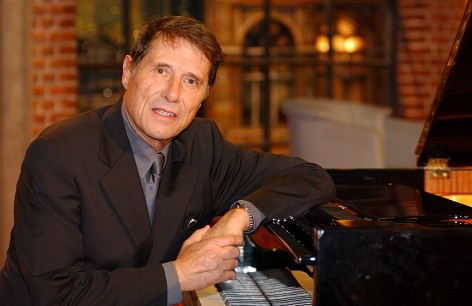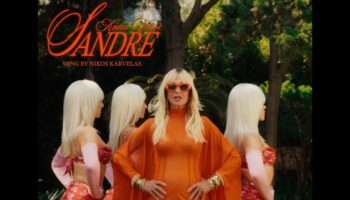The year that brought Austria its second victory in the Eurovision Song Contest has been witness to sad news for the country too, as its first winner at the European competition Udo Jürgens has sadly passed away. The artist was not just a Eurovision star, but practically a living legend in the German-speaking countries, and a renowned composer in other languages. Here is his story.
His name is branded into the history of music for his memorable tunes and his restless work as a prolific composer. The Eurovision Song Contest was touched by his talent and he gave it one of its timeless entries. Udo Jürgens, the first singer to win the Contest for Austria, passed away after a long and unforgettable career, leaving behind a void that might never be filled again.
Jürgen Udo Bockelman was born on 30 September 1934 in Klagenfurt, in the Austrian state of Carinthia. He grew up in the parental residence of Ottmanach, in Magdalensberg.
His path in music started at an early age, and his parent provided him with a comprehensive music education. He was 5 years old when he made his first approach to music with a harmonica. Three years later he received an accordion.
When he was ten he was called to join the Hitler Youth, a service which was mandatory in the country at the time, but he was expelled shortly afterwards because the supervisor found him to be too delicate. Despite this short stay, he had to carry an everlasting memory of it: he was slapped so badly once by the Jugendschaftsführer that he was left with a significant hearing loss of the left ear.
This injury would not be an impediment (Beethoven suffered from a progressive hearing loss), and at 12 he was determined to become a musician and joined the Klagenfurt Conservatory. Among other things, he would develop into being a gifted pianist.
Early in the 50s he started performing as Udo Bolan with a band at different locals.
In 1950 he won the first prize as the youngest participant in a competition organized by the Austrian broadcaster ORF. His song Je t’aime was the winner out of 300 competing entries. Udo Jürgens was 16 at the time.
A few years would have to go by until he started having some discrete hits such as Jenny in 1959, and in the early 60s he would start shaping his legend as a solo artist in the German-speaking world.
It was in the 60s when Udo Jürgens would become a part of the history of the Eurovision Song Contest with a notable trajectory. He participated three times in a row for Austria (like Lys Assia for Switzerland, Corry Brokken for the Netherlands and Valentina Monetta for San Marino). In 1964 he finished 6th with Warum nur, warum He climbed up to the 4th place in 1965 with with Sag ihr, ich lass sie grüssen.
http://www.youtube.com/watch?v=tj9VlUuARwY
http://www.youtube.com/watch?v=MQAHC7Qt-CY
But his triumph would come in 1966 with the celebrated Eurovision winning classic Merci chérie. Despite having the title in French, the lyrics of the song were in German, complying with the Eurovision Song Contest’s rulebook, which reiterated that year that the entries had to be sung in one of the recognized official languages of the participating country, a rule that was prompted by Sweden’s entry in English the previous year. Merci chérie was the first song in German language to win the Contest, and it remains one of only two which have accomplished that. Besides, with this victory, Udo Jürgens remains to date the only Eurovision performer to take the trophy at his third (consecutive) attempt.
Jürgens would return yet one more year to the Eurovision Song Contest when it was celebrated in Vienna in 1967, as he was the conductor of the Austrian entry that year, Warum es hunderttausend Sterne gibt, performed by Peter Horten.
And then again in 1968 the Austrian entry would have the touch of Udo Jürgens, as he composed the song that Karel Gott presented for the country, Tausend Fenster.
His role in the Eurovision Song Contest was just a sample of his achievements. His Eurovision songs have turned into classics, but they are just a few of the many (around 1000) tunes that he composed and performed. Some of them were even adapted into other languages (Merci chérie had versions in Spanish, English, French, Italian, Japanese and covers in more anguages) and some of those adaptations were performed by singers universally recognized. Just to mention a few examples: Griechischer Wein was adapted into Come share the wine, which was performed by Bing Crosby; Warum nur warum was sung by Matt Monro as Walk away.
On the occasion of the FIFA Wold Cup in Argentina in 1978, Udo Jürgens composed the track Buenos días, Argentina, which he performed together with the German national football team that year. The English version was performed by the singer Marty Robbins, and it earned Jürgens the Country Music Award of the American Society of Composers Authors and Publishers.
More songs that he composed and that remain in the collective memory of the Austrians, Germans and Swiss include Vielen Dank für die Blumen, Es wird Nacht Señorita, Mit 66 Jahren… The list is long.
His talent and skills pulled the attention of record companies, and this would take Jürgens to write songs for such figures as Shirley Bassey, who recorded Udo’s Reach for the stars, or Sammy Davis Jr., who sang If I never sing another song, adapted from the original Illusionen. Davis Jr. would finish all his concert with Jürgens composition from then on.
Along with success came also a deep crisis. Udo Jürgens went through a time in which he drank and smoked in excess. He was found speeding in the highway at 220km/h when under the influence. The singer himself recognized once that all these excesses brought him close to death. When looking back on those years, he would explain that conduct saying that it is harder to digest success than cope with failure. Being successful is the ordinary madness of a young artist.
He was quite unlucky in love too. He had many relationship changes and he was married three times.
His musical proficiency and success were not affected by his personal life. Despite everything, he went on working as a composer and a singer, leading a career that yielded 50 albums, 1000 songs written and 100 million records sold. In 1970 he did a marathon tour all over Europe which attracted huge audiences.
He also composed classical music and conducted the Vienna Philharmonic Orchestra in the 80s.
Udo Jürgens always remained faithful to his style, away from trends and prevailing tastes, adding social critic to his lyrics.
Apart from a musician, he was an author, too. He wrote the autobiographical novel Der Mann mit dem Fagott and composed the musical I’ve never been to New York.
Udo Jürgens moved to Switzerland in 1977 and he obtained the Swiss nationality in 2007.
For decades, Udo Jürgens was the favorite of the crowds. He will be remembered for his legendary live performances and also (why not) for his encores in a bathrobe, after the concert was over and he was ready to relax.
Austria and all the German-speaking countries have lost an icon. His footprint in the German culture is so deep that he was honored by the German broadcaster ZDF with an 80th birthday Gala last 30 September: Udo Jürgens-Mitten im Leben. The show was broadcast again on 22 December, as a homage to the recently deceased artist.
Udo Jürgens was busy with his tour Mitten im Leben (halfway through life) when he passed away in Gottlieb, Switzerland at the age of 80.
On behalf of all the team at esctoday.com, Merci chéri.









